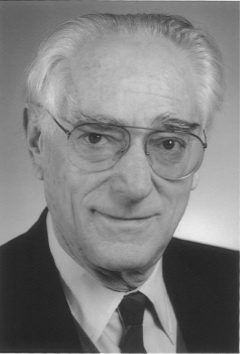
Heinz Gerischer was born on March 31, 1919 in Wittenberg, Germany. He studied chemistry nearby at the University of Leipzig. Gerischer endured tragedy as a young man. His studies were interrupted for 2 years by military service during World War II. This ended with expulsion from the army in 1942 because his mother was born Jewish. She committed suicide in 1943, and his one sister escaped a Gestapo prison only to be killed later in an air raid in 1944.
Some of the details of Gerischer's early life are unclear, but we know that he was able to complete his studies. He received his doctorate in 1946 from the University of Leipzig. His dissertation examined periodic oscillations on an electrode surface. Gerischer spent the next several years in Göttingen and then Berlin. His early work examined kinetics at metal electrode surfaces. He played an important role in the development of electroanalytical techniques and the potentiostat, a mainstay in any electrochemical laboratory today (Z. Electrochem., 61, 789 (1957)). He received his habilitation from the University of Stuttgart in 1955. It was here in the mid-1950s that Gerischer was inspired by work at AT&T Bell Laboratories on semiconductors. On hearing a report in 1956 of the work of Brattain and Garrett on semiconductors in contact with electrolytes, Gerischer said, “I realized that a new type of electrochemical process occurred ...
Get Electrochemical Engineering now with the O’Reilly learning platform.
O’Reilly members experience books, live events, courses curated by job role, and more from O’Reilly and nearly 200 top publishers.

